Difference between a Full Stack Developer and a Software Engineer
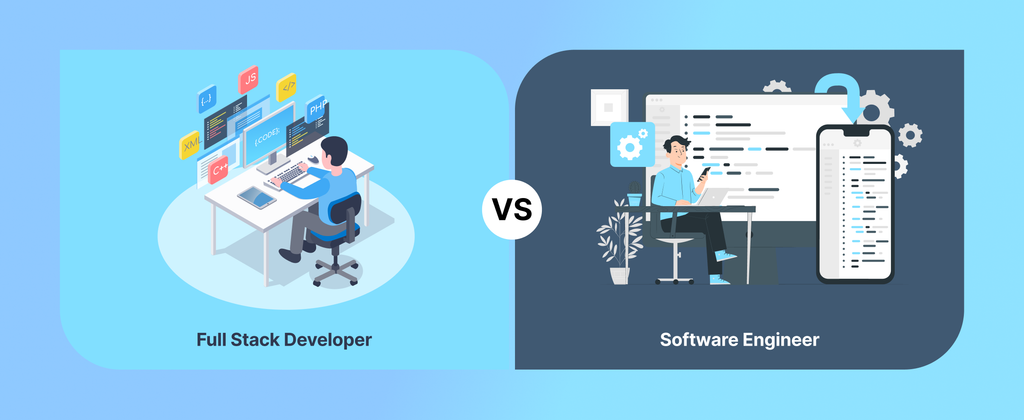
Are you considering a career in tech or computer science but unsure whether to explore development or engineering? That's perfectly fine if you're still navigating your options. It's helpful to understand the distinctions between full-stack developers and software engineers.
These roles might look alike in the professional world, but you can't easily swap one for the other. They differ in multiple aspects, ranging from the nature of projects they handle to their depth of expertise.
This article breaks down the distinctions between full-stack developers and software engineers, helping you decide which career path suits you best.
What is a Full-Stack Developer?
A Full-Stack Developer is someone with expertise in both the visual aspects of a website or application that users interact with (front-end) and the behind-the-scenes functionalities and databases that make it work (back-end). They're like all-around engineers who can do everything needed to create software or websites.
Full-Stack Developer is a versatile professional who excels in both front-end and back-end development, covering the entire spectrum of creating websites or applications. They are like tech-savvy architects, designing the visible parts that users interact with and simultaneously orchestrating the complex infrastructure that powers the software behind the scenes. This dual expertise enables them to seamlessly integrate design and functionality, ensuring a holistic approach to crafting user-friendly and efficient digital solutions.
In essence, Full-Stack Developers play a pivotal role in the world of technology, serving as all-in-one specialists capable of bringing a digital project to life. Their ability to navigate both the visual and technical realms of software development makes them valuable contributors to every stage of creating robust and engaging web applications.
Types of full-stack developers
1. Full-Stack Web Developer
Specializing in both front-end and back-end development for web applications.
2. Full-Stack Mobile Developer
Proficient in developing both front-end and back-end for mobile applications.
3. JavaScript Full-Stack Developer
Expertise in using JavaScript for both client-side and server-side development.
4. MEAN Stack Developer
Specializing in the MEAN stack (MongoDB, Express.js, Angular, Node.js) for web applications.
5. MERN Stack Developer
Proficient in the MERN stack (MongoDB, Express.js, React, Node.js) for scalable web applications.
6. Full-Stack Python Developer
Utilizes Python for both front-end and back-end development.
7. Ruby on Rails Full-Stack Developer
Specializing in the Ruby on Rails framework for web applications.
8. Full-Stack PHP Developer
Focuses on using PHP for server-side and client-side development.
9. Full-Stack .NET Developer
Proficient in using the .NET framework for both front-end and back-end development.
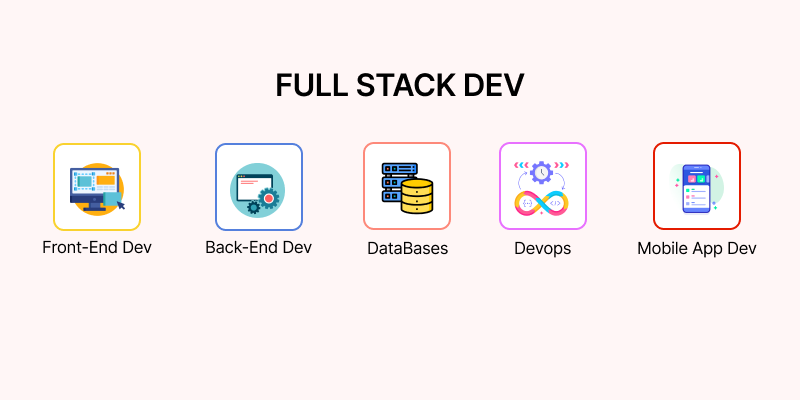
What do Full-Stack Developers do?
1. Front-End Development Designing and implementing user interfaces to enhance the visual aspects of a website or application.
2. Back-End Development Handling server-side logic and databases to ensure the functionality and performance of the software.
3. Database Management Managing and optimizing databases to store and retrieve information efficiently.
4. Server Management
Overseeing server configurations and ensuring the seamless operation of web applications.
5. Coding and Programming
Writing code for both the front-end and back-end of applications, often using a variety of programming languages.
6. Integration of APIs
7. Version Control
Using tools like Git to manage and track changes in the source code.
8. Problem-Solving Identifying and resolving issues or bugs in the software to ensure smooth operation.
9. Collaboration
Working closely with other team members, including designers and project managers, to achieve project goals.
10. Continuous Learning
Staying updated on emerging technologies and trends in both front-end and back-end development.
What is a Software Engineer?
Software engineering is the application of engineering principles to create, develop, and maintain computer software. A software engineer utilizes coding, testing, and problem-solving skills to design and build functional software solutions. The work involves managing the entire software development lifecycle, including implementation, testing, maintenance, and continuous improvement.
In addition to their foundational role in creating software, Software Engineers often specialize in various domains such as front-end or back-end development, mobile applications, or systems architecture.
They collaborate with cross-functional teams, ensuring that the developed software aligns with project goals and user requirements. Moreover, Software Engineers stay abreast of evolving technologies, participate in code reviews, and adhere to best practices to enhance the efficiency and security of software solutions. Their expertise is crucial not only in building reliable applications but also in addressing dynamic challenges, making them integral contributors to the ever-evolving landscape of technology.
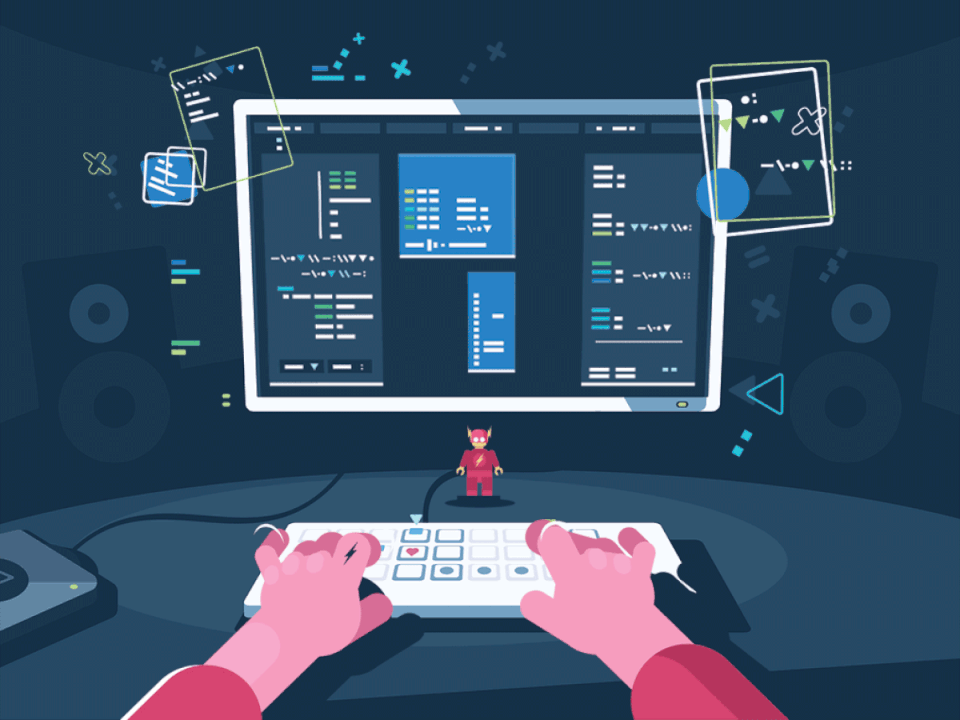
Types of Software Engineers
Software engineering is a diverse field, and professionals often specialize in specific areas based on their skills and interests. Here are some common types of software engineers:
1. Front-End Developer
Specializes in creating the visual elements and user interfaces of software applications that users interact with directly.
2. Back-End Developer
Focuses on the server side of software development, managing databases, server logic, and ensuring the smooth functioning of applications.
3. Full-Stack Developer
Possesses expertise in both front-end and back-end development and is capable of working on all aspects of a software project.
4. Mobile App Developer
Specializes in creating applications for mobile devices, often working with platforms like iOS or Android.
5. DevOps Engineer
Focuses on the collaboration between development and operations, automating processes to enhance software development, testing, and deployment.
6. QA Engineer (Quality Assurance)
Responsible for testing and ensuring the quality and functionality of software through various testing processes.
7. Security Engineer
Specializes in identifying and addressing security vulnerabilities in software, ensuring that applications are secure against potential threats.
8. Machine Learning Engineer
Works on developing algorithms and models for machine learning applications, often in fields like artificial intelligence and data science.
9. Embedded Systems Engineer
Focuses on developing software for embedded systems, which are specialized computing devices within larger systems.
10. Game Developer
Specializes in creating software for video games, involving aspects like graphics, physics, and gameplay mechanics.
These are just a few examples, and within each category, there can be further specialization based on technologies, frameworks, or industries. Software engineers often choose a path that aligns with their interests and career goals.
What do Software Developers do?
1. Design and Develop
Software engineers create computer programs and applications using coding languages.
2. Testing
They ensure the software functions correctly by identifying and fixing any bugs or issues.
3. Collaboration
Work with cross-functional teams to align software development with project goals.
4. Lifecycle Management
Oversee the entire software development process, from initial design to ongoing maintenance.
5. Problem-Solving
Apply critical thinking and problem-solving skills to address challenges in software development.
6. Quality Assurance
Ensure that the software meets quality standards and user requirements.
7. Continuous Improvement
Engage in ongoing efforts to enhance and optimize existing software solutions.
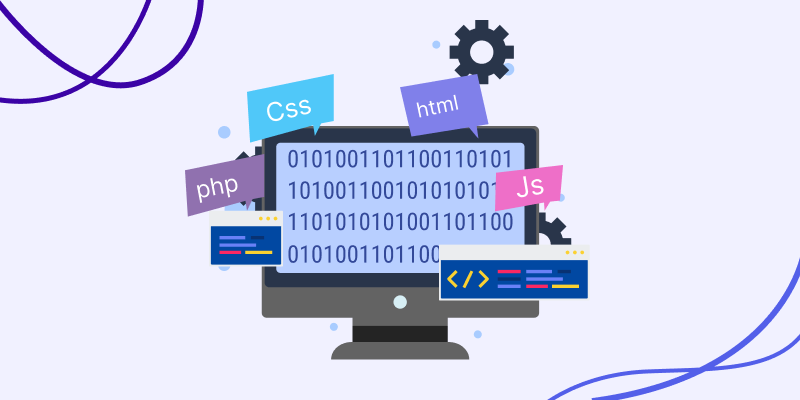
Key distinctions between full-stack developers and software engineers include
The distinction between a Full Stack Developer and a Software Engineer lies in their areas of expertise and the scope of their roles within the realm of software development.
Full Stack Developer
A Full Stack Developer is a specialist who possesses skills in both front-end and back-end development. They are proficient in creating the visual elements of a website or application (front-end) and managing the underlying functionality, databases, and server configurations (back-end). Full Stack Developers are like all-around engineers capable of contributing to every stage of a project, from design to implementation.
Software Engineer
Software Engineer is a broader term encompassing professionals who apply engineering principles to design, develop, test, and maintain computer software. While some Software Engineers may specialize in specific areas like front-end, and back-end, or even focus on domains such as security or machine learning, the term is often used in a more general sense. Software Engineers collaborate across various aspects of the software development lifecycle and may work on diverse projects beyond web development.
In essence, a Full Stack Developer is a specialized type of Software Engineer with a specific skill set focused on both front-end and back-end development, while a Software Engineer is a more encompassing term that may include professionals with various specializations within the broader field of software development.

Now let’s explore some commonly asked questions,
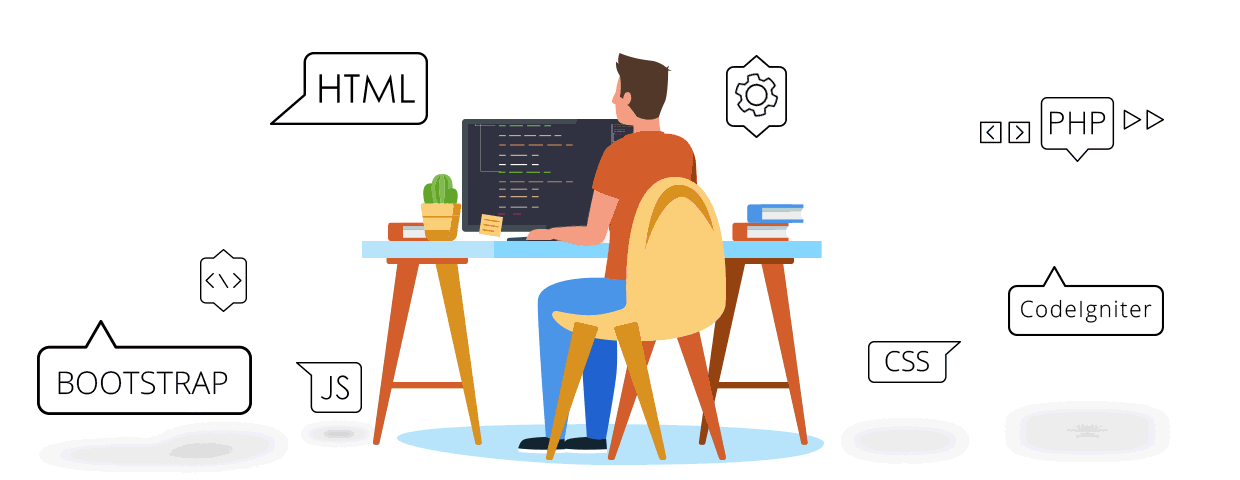
In conclusion, choosing between a full-stack developer and a software engineer depends on individual preferences, interests, and career goals. Full-stack developers have a broader skill set and may take on leadership roles, overseeing various aspects of a project. On the other hand, software engineers often work under the guidance of full-stack developers, specializing in specific project features.
It is recommended for individuals to explore both roles, understand their strengths and preferences, and align their choices with their skills and aspirations. Both paths offer growth opportunities, and the decision should be based on a thorough understanding of the specific responsibilities and tasks associated with each role.
Ultimately, the key is to make an informed decision that aligns with individual career objectives and provides the most fulfilling and rewarding professional journey.
